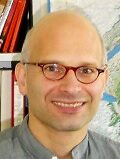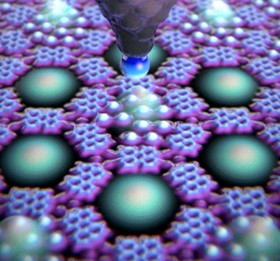[Seminar] "Programming electronic and spin states in 2D supramolecular architectures by modifications on the single atomic or molecular level" by Prof. Thomas A. Jung (Paul Scherrer Institute, Switzerland)

Date
Location
Description
Title:
"Programming electronic and spin states in 2D supramolecular architectures by modifications on the single atomic or molecular level"
Future quantum technologies rely on the understanding of the interaction between different electronic states in atoms or molecules. Surface supported atomic and molecular systems provide a base for such investigations with the particular advantage of addressability. In our work we establish on-surface architectures which exhibit specific electronic or spin states originating from the reduced dimensionality of the self-assembled and atomically precise architectures.
Quantum well arrays, exhibiting band-like electronic states [1] for example, can be produced by the interaction of porous on-surface networks with 2D Shockley-type surface states. These quantum wells have been modified by the adsorption / condensation of Xe atoms [2,3]. By designing the Xe filling pattern in the array, a quantum breadboard can be realized in remembrance of the breadboards used for testing electronic circuitry.
2D ‘checkerboard’ architectures of magnetic molecules containing different e.g. Fe, Mn spins, on exhibit particular magnetic properties and serve as templates for the modification of spins by e.g. ligands. On magnetic substrates their spin state is strongly determined by the substrate and can be selectively switched by ligation to e.g. NH3 [4]. On non-magnetic Au(111), we have observed the first example of 2D ferrimagnetic long-range order and remanence due to the RKKY interaction mediated by the surface states of the support [5].
Self-assembled 2D architectures contribute to our understanding of fundamental interactions involved in confinements [6] and in low dimensional systems.

[1] Lobo-Checa, J. et al., Science 325, 300, (2009)
[2]Nowakowska, S. et al., Nat. Commun. DOI: 10.1038/ncomms7071, (2015)
[3] Nowakowska, S. et al., Small 12, 3757, (2016) [4] Ballav N., et al., JPCL, 4, 2303, (2013)
[5] Girovsky, J. et al., Nat. Commun. DOI: 10.1038/ncomms15388, (2017)
[6] Ahsan, A. et al., Phys Chem Lett DOI: 10.1021/acs.jpclett.2c01592, (2022); and small
DOI: 10.1002/smll.201803169J. (2016).
Subscribe to the OIST Calendar: Right-click to download, then open in your calendar application.



